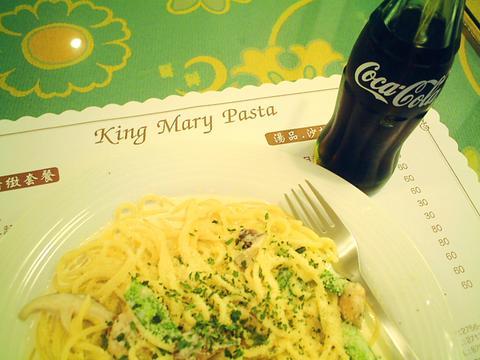There's a long-running debate about where the best Italian food can be found in Taipei. King Mary Pasta can be excluded from the discussion if you' re looking for haute cuisine. If, however, you're wanting a big helping of tasty pasta that weighs more than it costs, King Mary is the place to visit.
With seven locations in the metropolitan area and a menu that tops out under NT$200, Mary's is not so much about fine dining as frenzied feeding. The owners have forgone delicate ambience and decor for the kind of utilitarian esthetic you might find at, say, a Chuck E Cheese's pizza parlor; the kind of place you can hose down after the seven-year-olds' birthday party and reseat within five minutes. It's a shade classier than a traditional white-tiled Taiwanese restaurant; Mary's has red and green tiles thrown in to give it that authentic Italian feel.

PHOTO: DAVID MOMPHARD, TAIPEI TIMES
Mary's instead focuses on filling stomachs with a menu built on vermicelli pasta covered with a variety of sauces and toppings; chicken and snow peas, garlic, asparagus, tomatoes and more. All these dishes are priced at NT$100 and the portions are more than enough to fill you.
And there's over a dozen to choose from, so coming back often won't get boring. A smaller selection or baked pastas is available for NT$130 or, if you're really hungry, a set meal includes Italian-style soup, all the baked garlic bread you can eat, four-seasons fruit salad, your choice of any of the NT$100 pastas and coffee, tea or fruit juice. At NT$190, it's one of the best Western food bargains in town.
Mary's also has a selection of beverages and beers, including Corona and Heineken always on offer for NT$80 per bottle. There are occasionally other beers available for the asking; NT$100 Guinness and Grolsch for example. Check the daily specials board. The most expensive item on Mary's menu is wine. I asked what label it was and was told Californian. Sorry, Mary, I want to know a little more about it if I'm going to pay NT$250 for a glass.

April 28 to May 4 During the Japanese colonial era, a city’s “first” high school typically served Japanese students, while Taiwanese attended the “second” high school. Only in Taichung was this reversed. That’s because when Taichung First High School opened its doors on May 1, 1915 to serve Taiwanese students who were previously barred from secondary education, it was the only high school in town. Former principal Hideo Azukisawa threatened to quit when the government in 1922 attempted to transfer the “first” designation to a new local high school for Japanese students, leading to this unusual situation. Prior to the Taichung First

The Ministry of Education last month proposed a nationwide ban on mobile devices in schools, aiming to curb concerns over student phone addiction. Under the revised regulation, which will take effect in August, teachers and schools will be required to collect mobile devices — including phones, laptops and wearables devices — for safekeeping during school hours, unless they are being used for educational purposes. For Chang Fong-ching (張鳳琴), the ban will have a positive impact. “It’s a good move,” says the professor in the department of

On April 17, Chinese Nationalist Party (KMT) Chairman Eric Chu (朱立倫) launched a bold campaign to revive and revitalize the KMT base by calling for an impromptu rally at the Taipei prosecutor’s offices to protest recent arrests of KMT recall campaigners over allegations of forgery and fraud involving signatures of dead voters. The protest had no time to apply for permits and was illegal, but that played into the sense of opposition grievance at alleged weaponization of the judiciary by the Democratic Progressive Party (DPP) to “annihilate” the opposition parties. Blamed for faltering recall campaigns and faced with a KMT chair

Article 2 of the Additional Articles of the Constitution of the Republic of China (中華民國憲法增修條文) stipulates that upon a vote of no confidence in the premier, the president can dissolve the legislature within 10 days. If the legislature is dissolved, a new legislative election must be held within 60 days, and the legislators’ terms will then be reckoned from that election. Two weeks ago Taipei Mayor Chiang Wan-an (蔣萬安) of the Chinese Nationalist Party (KMT) proposed that the legislature hold a vote of no confidence in the premier and dare the president to dissolve the legislature. The legislature is currently controlled